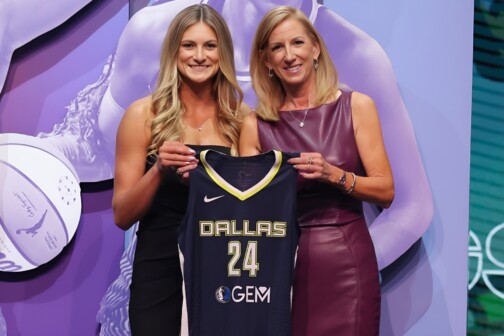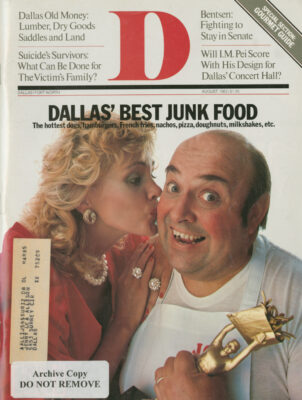A SEAT on a bank board, especially the board of one of Dallas’ megabanks, is considered to be among the clearest signs of arrival for corporate chieftains, ranking even higher than having a secretary with an English accent. What a person doesn’t do, ever, is join such a rarefied board, go to a few meetings and then resign with the curt observation, “I don’t want to go to any more meetings I can’t adjourn myself. ” No, you don’t do that unless you’re a particular Dallas entrepreneur who really does believe in the motto found on New Hampshire license plates, “Live free or die. “
Captains of industry gain great pleasure from exhorting their troops to fan the flames of their entrepreneurial instincts. But entrepreneurs are often the antithesis in character and makeup of those corporate leaders. When you walk through their executive suites, you hear the sounds of memos being written and flanks being protected. “Prudent” is a word favored by those corporate leaders. It’s the very word that makes an entrepreneur pack it in. Take a recent example, Howard Head. He invented metal skis, then sold the company he founded to a leisure-time conglomerate, AMF, for $16 million.
Evidently, either Head knew enough about himself to realize that working for AMF would not be his cup of tea, or AMF couldn’t figure out a way to keep him. Too bad, AMF, because the next thing Howard Head invented was the oversize tennis racket. No, he couldn’t call it the Head racket because he had sold the rights to the name to AMF, and AMF had its own fairly successful line of tennis rackets marketed under the Head name. So Howard Head called his new racket the Prince. Naturally, it was an object of derision. But entrepreneurs have enough self-esteem to withstand large portions of derision.
And Head just kept going until a couple of months ago, when Chesebrough-Ponds, the makers of Vaseline, paid him $62 million in stock for his Prince racket idea. Here’s my modest prediction: Howard Head has been retained as a consultant by Chesebrough-Ponds. This will last until Head comes up with an idea that some committee that knows how to sell Vaseline feels is uncomfortably bizarre. The consulting contract will be terminated, at which point Head will again go on his own, and his bizarre idea will begin an entirely new market. And the Vaseline people will comfortably forget that Head gave them the idea in the first place.
Ross Perot said he wouldn’t show his company’s books to anyone during the first few years of EDS’ existence. He figured that if the numbers scared him, they would terrify an outsider. It’s Perot’s interesting theory that what makes a successful entrepreneur is the capacity to absorb pain without becoming immobilized. Rejection, for example – whether it’s parents’ rejection of children, teachers’ of students or spouses’ of each other-can paralyze as well as pay for the braces of psychiatrists’ children. Rejection, however, for an entrepreneur is a strange kind of fuel, as it keeps them going in the face of the longest odds.
The swashbuckling nature of some entrepreneurs doesn’t mean that they are bereft of the usual insecurities that plague many corporate executives. With one definite exception: Entrepreneurs believe that they could do it again. Maybe not the same thing. Or with the same scope. But they could do it, and they would. Entrepreneurs do not have that anxiety you see in the faces of some men who are simply hanging on, uncertain as to whether they could get to their current level again. It comes down to a feeling of self worth; the entrepreneur has established his.
There’s no question; entrepreneurs aredifferent. For one thing, they are a troubling reminder to corporations gone softof the attributes those corporations aremissing. An entrepreneur doesn’t go toWashington for a bailout or to his congressman to lament competition fromJapan. No, an entrepreneur is more likelyto do what Fred Smith, the founder ofFederal Express, did. Early in the company’s history, the outlook was bleak. Itdidn’t look as though the next payrollcould be met, so Fred Smith did the logicalthing: He gathered up all the money hecould put his hands on, went to Las Vegasfor the weekend and won enough moneyto keep Federal Express going. You haveto be in the game all the time, and that’swhat entrepreneurs understand.
Related Articles

Basketball
Watch Out, People. The Wings Had a Great Draft.
Rookie Jacy Sheldon will D up on Caitlin Clark in the team's one preseason game in Arlington.
By Dorothy Gentry
Local News
Leading Off (4/18/24)
Your Thursday Leading Off is tardy to the party, thanks to some technical difficulties.

Arts & Entertainment
Curve Ball: Local Shorts Highlight Diverse USA Film Festival Slate
A college freshman spotlights his high school pitching coach’s unique baseball story in his filmmaking debut.
By Todd Jorgenson


